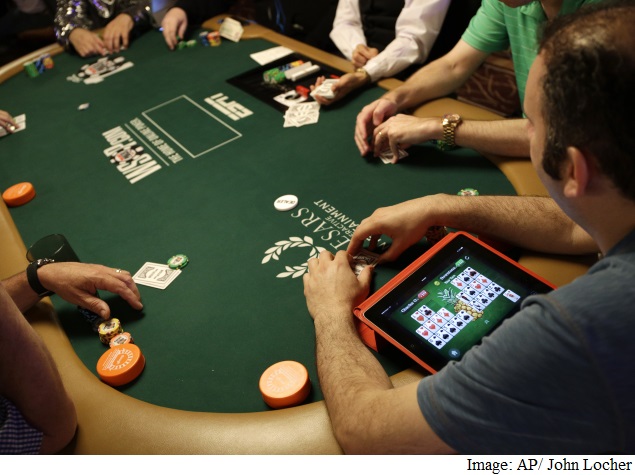- Home
- Science
- Science News
- Know When to Fold 'Em: Computer Aces Texas Hold 'Em Poker
Know When to Fold 'Em: Computer Aces Texas Hold 'Em Poker

These and thousands of other decisions in the popular two-person version of the poker game "limit Texas hold 'em" produce a strategy so close to optimal that it cannot be beaten in the long run, according to a study published on Thursday in the journal Science.
A computer programme running this strategy is the first to "solve" any form of poker: it plays as close to perfectly as is mathematically possible, coming out no worse than even (over many hands) no matter what an opponent holds or does, said computer scientist Michael Bowling of the University of Alberta, who led the research.
Far from being a frivolous exercise, the poker-playing programme "Cepheus" could be applied to cyber-security, medicine, and even business negotiations, said Carnegie Mellon University computer scientist Sam Ganzfried, co-author of the programme that won the 2014 computer poker competition.
"The result is a significant achievement in computer poker and in artificial intelligence," he said.
Computers and games have a long intertwined history. Programs that beat the best human players at checkers, chess, and Jeopardy! have served as testbeds for advances in artificial intelligence as well as more mundane matters: strategies used by chess-playing computers, for instance, led to optimization strategies for sewer routing, Bowling said.
Poker presents an especially steep challenge because, unlike in chess or checkers, a computer does not know its opponent's situation - his cards. And the number of theoretically possible situations where players must estimate odds and choose whether to bet, call, raise, or fold is so huge - 319 trillion - that it taxes any machine's computational and memory capacity.
Cepheus plays two-person limit Texas hold 'em. ("Limit" means the size of bets and number of raises are capped.) The dealer gives each player two cards face down, and then five shared cards, one at a time and face up. Players bet after each deal and use the shared cards to assemble the best-possible five-card hand.
Among Cepheus's winning strategies: almost always raise after the first two cards, but fold with likely losers such as a 3 and 7 or a 2 and Jack. The public can see the ideal moves and play against Cepheus.
© Thomson Reuters 2015
Catch the latest from the Consumer Electronics Show on Gadgets 360, at our CES 2026 hub.
- Samsung Galaxy Unpacked 2025
- ChatGPT
- Redmi Note 14 Pro+
- iPhone 16
- Apple Vision Pro
- Oneplus 12
- OnePlus Nord CE 3 Lite 5G
- iPhone 13
- Xiaomi 14 Pro
- Oppo Find N3
- Tecno Spark Go (2023)
- Realme V30
- Best Phones Under 25000
- Samsung Galaxy S24 Series
- Cryptocurrency
- iQoo 12
- Samsung Galaxy S24 Ultra
- Giottus
- Samsung Galaxy Z Flip 5
- Apple 'Scary Fast'
- Housefull 5
- GoPro Hero 12 Black Review
- Invincible Season 2
- JioGlass
- HD Ready TV
- Laptop Under 50000
- Smartwatch Under 10000
- Latest Mobile Phones
- Compare Phones
- OPPO Reno 15 Pro Max
- Honor Win RT
- Honor Win
- Xiaomi 17 Ultra Leica Edition
- Xiaomi 17 Ultra
- Huawei Nova 15
- Huawei Nova 15 Pro
- Huawei Nova 15 Ultra
- Asus ProArt P16
- MacBook Pro 14-inch (M5, 2025)
- OPPO Pad Air 5
- Huawei MatePad 11.5 (2026)
- Xiaomi Watch 5
- Huawei Watch 10th Anniversary Edition
- Acerpure Nitro Z Series 100-inch QLED TV
- Samsung 43 Inch LED Ultra HD (4K) Smart TV (UA43UE81AFULXL)
- Asus ROG Ally
- Nintendo Switch Lite
- Haier 1.6 Ton 5 Star Inverter Split AC (HSU19G-MZAID5BN-INV)
- Haier 1.6 Ton 5 Star Inverter Split AC (HSU19G-MZAIM5BN-INV)












